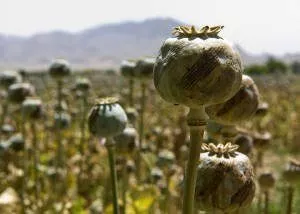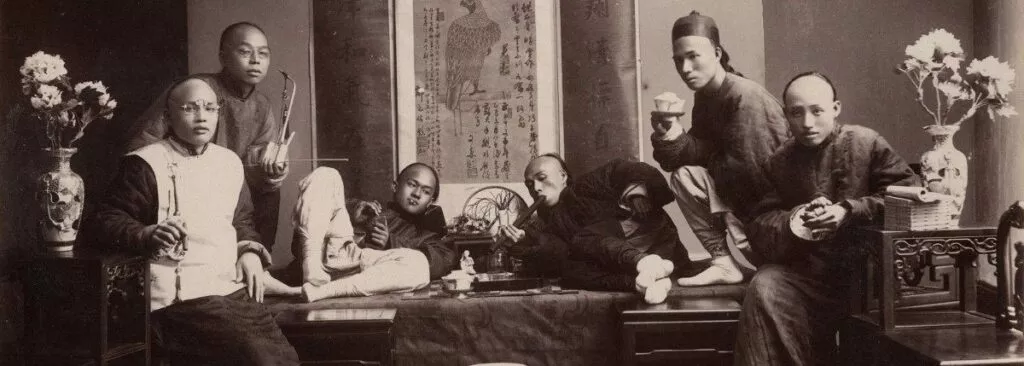Histoire du Thé
Les guerres de l’opium et le thé
L’histoire des guerres de l’opium est un récit sombre et complexe qui met à jour les rouages de l’impérialisme britannique et ses conséquences désastreuses sur la Chine et son peuple. Durant le XIXe siècle, l’Empire britannique, insatiable de richesse et de pouvoir, s’engage dans un conflit sanglant contre la Chine. Elle tente par tous les moyens d’imposer le commerce lucratif de l’opium, tout en s’assurant un accès continu au thé, breuvage devenu indispensable pour la société britannique.
Menu
La Compagnie britannique des Indes orientales
En l’an 1600, alors que l’Europe s’enflamme pour les richesses de l’Orient, la reine Élisabeth Iʳᵉ d’Angleterre donne naissance à une société de commerce qui va bouleverser le cours de l’histoire.
Née d’une volonté de rivaliser avec les puissances européennes sur l’importation de produits tels que le thé, les épices et les textiles, la Compagnie britannique des Indes orientales (British East India Company) ne se contente pas de dominer les mers. Au fil du XVIIe siècle, elle étend son influence sur le continent indien, posant les jalons d’un empire colonial.
Déficit commercial de la Compagnie
En 1711, la Compagnie britannique des Indes orientales établit un comptoir à Canton (Guangzhou), en Chine, mue par l’appât du gain et la soif de produits exotiques très demandés en Europe. À cette époque, la Chine détient un quasi-monopole sur le commerce de marchandises précieuses comme la soie, le thé et la porcelaine. L’Europe, fascinée par ces produits raffinés, est prête à payer des prix élevés.
En conséquence, la Compagnie britannique des Indes orientales est confrontée à des dettes croissantes, notamment dues à des investissements importants dans ses colonies indiennes et à des prix d’achat élevés des produits chinois. Face à cette situation financière précaire, elle se doit de trouver des solutions innovantes pour renflouer ses caisses et assurer sa pérennité.
Du thé en échange d’opium
L’opium, une drogue addictive dérivée du pavot, est alors produit en abondance dans les plantations de la Compagnie, notamment au Bengale. La Compagnie met ainsi en place un commerce triangulaire : elle vend de l’opium indien aux Chinois, enfreignant l’interdiction chinoise sur cette drogue, puis utilise l’argent récolté pour acheter des produits chinois tels que la soie, le thé et la porcelaine.
En 1839, les ventes d’opium à la Chine financent la totalité du commerce du thé britannique.

Un siècle de tentative de prohibition sur l’opium
Dès 1729, l’empereur Yong Zheng, conscient des effets dévastateurs de l’opium sur son peuple, promulgue un décret impérial interdisant son commerce et sa consommation sur le territoire chinois. Cette décision s’inscrit dans une volonté de préserver la santé publique, de maintenir l’ordre social et de protéger l’économie chinoise face à l’afflux d’argent drainé par l’achat d’opium.
Malgré les efforts des autorités chinoises, la contrebande d’opium orchestrée par la Compagnie britannique des Indes orientales continue à prospérer, rendant l’interdiction difficile à appliquer efficacement.
C’est en 1839, sous le règne de l’empereur Daoguang, que la cour impériale chinoise décide de s’adresser directement à la reine Victoria d’Angleterre. Elle exige officiellement la cessation du commerce de l’opium, illustrant l’exaspération croissante face à ce trafic illégal.
Destruction de caisses d’opium
En 1839, le commissaire impérial Lin Zexu ordonne la saisie et la destruction de 200 000 caisses d’opium, soit environ 2500 tonnes, envoyées par la Compagnie britannique des Indes orientales. Cette action forte et radicale vise à marquer la détermination de la Chine à mettre fin au commerce de l’opium et à protéger son peuple de ses effets néfastes.
Côté britannique, la destruction des caisses d’opium provoque indignation et colère. Les dirigeants britanniques considèrent cette action comme une atteinte à leurs intérêts commerciaux et à leur influence en Chine.
Première guerre de l’opium
En parallèles, de nombreux facteurs contribuent aux tensions croissantes entre la Chine et la Grande-Bretagne, notamment l’inégalité des relations commerciales, la volonté britannique d’ouvrir davantage le marché chinois et l’opposition chinoise à l’ingérence étrangère.
La Première Guerre de l’Opium éclate en 1840, un an après la destruction des caisses d’opium, illustrant l’escalade rapide des tensions entre les deux puissances.
Ce conflit débute par des affrontements navals limités le long des côtes chinoises. Les forces britanniques, mieux équipées et plus expérimentées, remportent les premières victoires.
Une seconde phase est marquée par l’extension du conflit à l’intérieur des terres chinoises. Les troupes britanniques remontent le fleuve Yangzi Jiang et s’emparent de plusieurs villes importantes, dont Canton et Nanjing. Face à la puissance militaire britannique et à la pression internationale, la Chine est contrainte de négocier un traité de paix.
Le traité de Nankin
Le traité de Nankin, signé en 1842, met fin à la Première Guerre de l’Opium et marque un tournant majeur dans les relations sino-britanniques.
Les conséquences sont lourdes pour l’Empire chinois. Il se voit contraint d’ouvrir cinq ports au commerce britannique (Canton, Amoy, Fuzhou, Ningbo et Shanghai), de cèder l’île de Hong-Kong à la Grande-Bretagne et s’acquitte d’une lourde indemnité de guerre.
D’une manière générale, ce traité humilie la Chine et l’oblige à s’ouvrir au commerce extérieur, renforçant la domination britannique dans la région. Il pose également les bases d’une période d’inégalités et d’exploitation qui se poursuivra tout au long du XIXe siècle.
La seconde guerre de l’opium (1856-1860)
Malgré le traité de Nankin et ses concessions, la Grande-Bretagne restait insatisfaite des restrictions imposées au commerce et cherchait à étendre davantage son influence en Chine. Cette dernière rechignait à accorder aux Britanniques un accès plus large à son marché et maintenait des restrictions sur le commerce et les déplacements étrangers.
En 1856, l’arraisonnement par les Britanniques d’un navire chinois, l’Arrow, sous prétexte de contrebande d’opium, déclencha la crise qui mena à la guerre.
Dans un premier temps, les forces britanniques et françaises, alliées pour l’occasion, remportèrent plusieurs batailles navales et prirent le contrôle de Canton. En 1858, la Chine, vaincue, signa le traité de Tianjin, ouvrant onze ports supplémentaires au commerce étranger, légalisant l’opium et cédant des territoires à la Grande-Bretagne.
La Chine, humiliée par le traité, refusa de le ratifier, ce qui relança les hostilités. Les troupes franco-britanniques, en représailles, pillèrent et incendièrent le Palais d’Été à Pékin, symbole de la grandeur impériale chinoise. En 1860, la Chine, face à une défaite cuisante, signa le traité de Pékin, confirmant les dispositions du traité de Tianjin et accordant des concessions encore plus importantes aux puissances occidentales.
Les conséquences des guerres de l’opium
La victoire britannique consolida sa position dominante en Chine et ouvrit la voie à une colonisation accrue en Asie. L’afflux massif d’argent étranger vers la Grande-Bretagne, contribua par ailleurs au renforcement de sa puissance économique.
Côté chinois, la guerre et ses répercussions humiliantes contribuèrent à nourrir le sentiment anti-impérialiste et le désir de modernisation qui mèneront à la Révolution chinoise de 1911.
Les conséquences sociales et économiques furent également importantes, notamment une augmentation de l’addiction à l’opium parmi la population et une intensification des tensions sociales et des mouvements nationalistes.
Un bouleversement du marché du thé
Les guerres de l’opium ont joué un rôle déterminant dans l’essor du commerce du thé, en facilitant l’importation massive à des prix avantageux.
Parallèlement, les puissances européennes, menées par la Grande-Bretagne, s’investissent dans des projets de production de thé oxydé dans leurs colonies, comme l’Inde et le Sri Lanka pour la Grande-Bretagne, ou encore l’Indonésie pour les Pays-Bas.
L’essor de la culture du thé dans les colonies asiatiques a profondément transformé les méthodes de production, avec l’introduction de processus industriels et l’exploitation d’une main-d’œuvre à bas coût. Cette évolution a mis fin au monopole chinois sur le commerce du thé et permis aux compagnies occidentales d’accroître largement leurs bénéfices.
Pour aller plus loin :
- Les guerres de l’opium en Chine sur le site les-crises.fr.
- Guerres de l’opium, pavot pas pris sur France Culture


“Les vertus se perdent dans l’intérêt comme Les fleuves se perdent dans. la mer.”
Le pouvoir et la criminalité chevauchent…